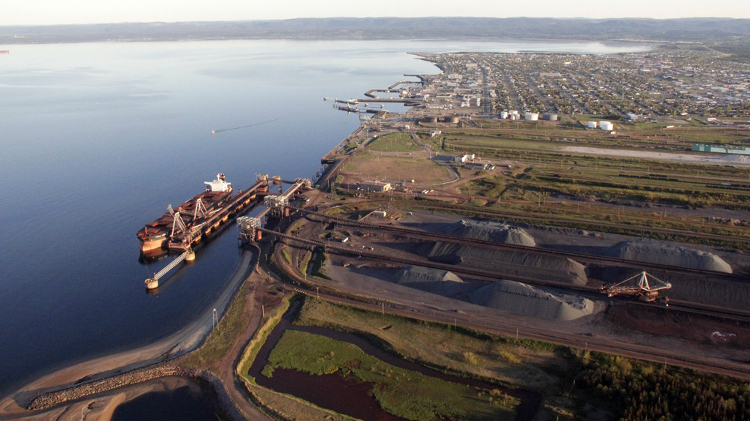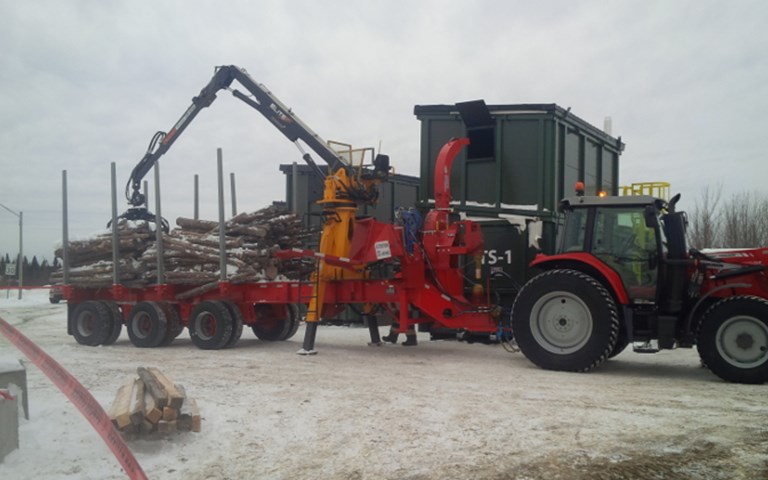Logs from surrounding forestry operations are stored during the summer and fall months in an on-site facility that can house 5,000 tonnes of biomass. Courtesy of Norforce Énergie
A biomass heating project at Hecla Quebec’s Casa Berardi mine, 95 kilometres north of La Sarre in western Quebec, entered phase two this winter, ramping up from using two heat exchange units to seven. The mine is the first underground mine in the province to be heated by forest biomass.
The project – spearheaded by La Sarre-based biomass energy company Norforce Énergie – provides the mine site’s surface buildings with heat generated from residual forest biomass that comes from the discarded logs of forestry operations in the surrounding Abitibi-Témiscamingue region. The operations send their undesirable logs to the Hecla site to be stored for the summer and fall in a facility on site built specifically for the project. The storage facility can house 5,000 tonnes of biomass. In the winter, the dry logs are turned into wood chips and fed into the conversion units.
During the project’s first phase, which lasted from winter 2014 to winter 2015, Norforce and Hecla saw the site reduce its propane usage by 45,000 litres.
“The pilot test in 2014 gave us all the data to see the impact of the two machines in the propane heating system of the mine ... and we had a very significant impact,” said Christian Léveillé, Norforce’s executive director. “We expect the machine will have a great impact on the propane consumption [in the second phase].”
The seven heat exchange units will use between 4,500 and 6,000 tonnes of biomass per year, and each generates 500 kilowatts of power. Léveillé said the second phase of the project would last at least nine years.
Prior to beginning the project, Casa Berardi was heated exclusively by propane in the winter months of mid-November to mid-April, and annually it would use between 2.5 and 3 million litres. The goal, however, is not to phase out propane entirely, but to cut greenhouse gas emissions at the site while having a functional hybrid heating system. During warmer winter days of around 0 degrees Celsius, Léveillé explained, biomass would heat the site, as propane does not work as well at those temperatures. Propane would continue to heat the site on colder days.
“The ultimate goal is to be able to ... not be dependent on one of these energies, and to compensate for any eventuality,” said Josée Plouffe, Hecla Quebec’s regional communication coordinator.
The $3-million project has received $1.1 million from Quebec’s ministry of energy and natural resources through its greenhouse gas program, and is expected to avoid 2,732 tonnes of greenhouse gas emissions per year by using biomass instead of propane. Norforce is selling the heat to Hecla, and will make money based on how much propane is saved each year.
Norforce, the joint creation of Metal Marquis and Coopérative forestière St-Dominique, approached Aurizon Mines in 2011 about heating Casa Berardi with biomass. While the two companies were negotiating, the underground gold mine was sold to Hecla, and talks began again.
The pilot project began in 2013, but the machines were not installed until January 2014. First, Norforce had to find the right technology for the job. Initially, Léveillé said, the company looked to technology used in sawmills to burn bark, but the machines were too large and each time they made an energy transfer, there was a loss of energy. “We wanted to use a technology that makes less energy transfers,” he said.
The company eventually settled on a technology that is currently used in agriculture to dry crops, and adapted it to the site’s needs. “We have a machine that produces energy with no water … so it’s like a heat gun. It produces hot, clean air and that’s what the mine needs,” Léveillé said.
Boosting the local economy is an added bonus as Abitibi-Témiscamingue does not produce propane, but it has a strong forestry economy. “Hecla has to buy propane from Montreal and Sarnia, Ontario, so that money it spends on propane leaves the region,” Léveillé said. “[Instead, they can] buy biomass that’s locally produced. It gives the region money that would actually go out of Abitibi-Témiscamingue.”
Léveillé said he sees plenty of opportunities for other mining companies to begin using biomass on their sites. “Eighty per cent of operating mines have a [propane] heating system like Casa Berardi,” he said. “So the potential of that kind of project is huge. We are in a good position right now to develop that kind of project."




